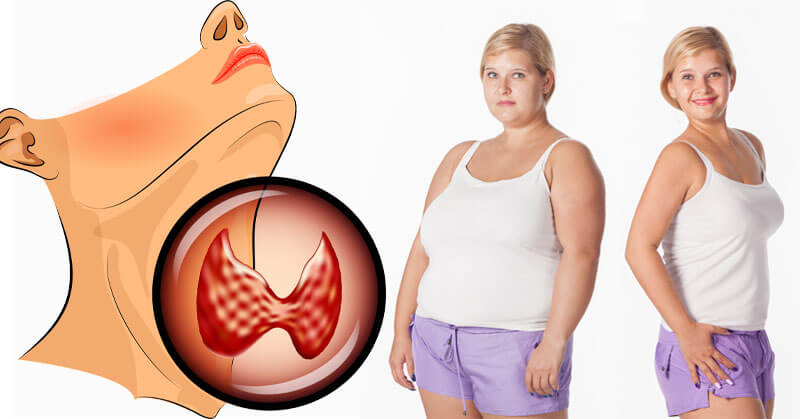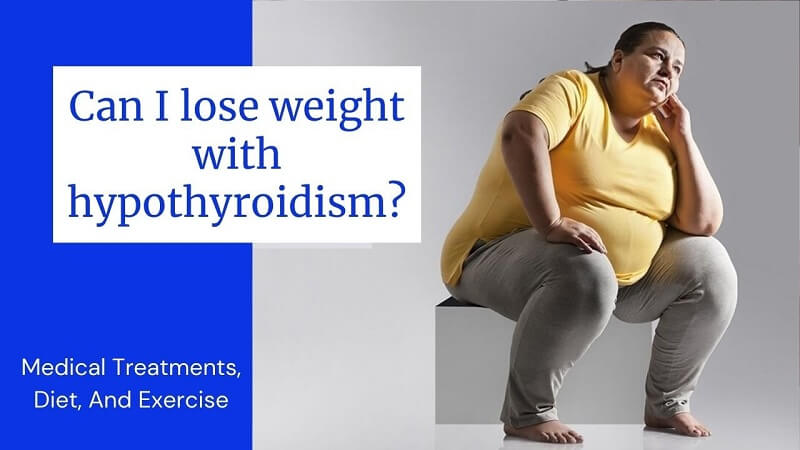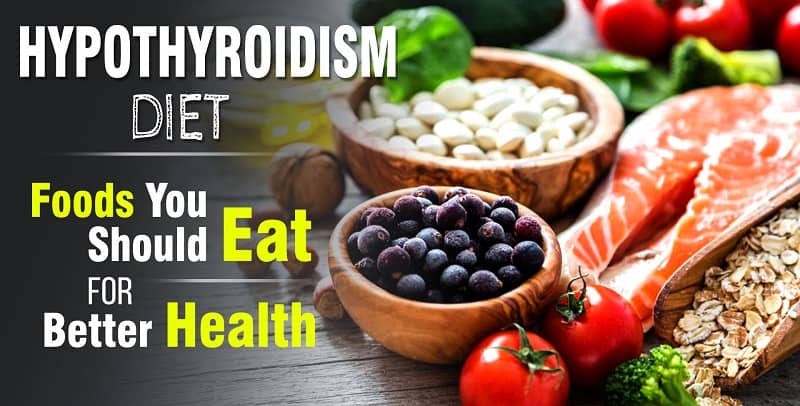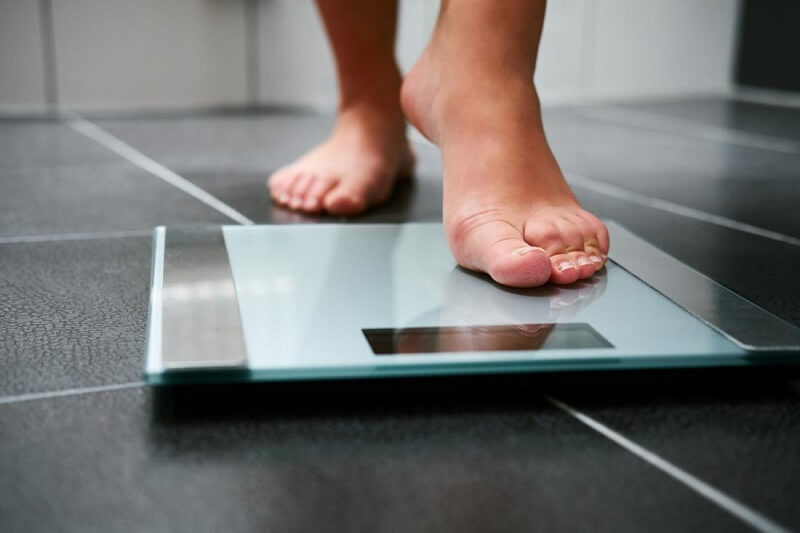In this article we will discuss how to lose weight with hypothyroidism, what are the best diet for thyroid patients to lose weight, and overactive thyroid weight loss.
There has been much-losing weight with hypothyroidism success stories and it is certainly not an impossible task to accomplish.
With the right diet and exercise, one can achieve this herculean task.
Before moving towards the relationship between hypothyroidism and weight loss, we will first briefly discuss what hypothyroidism really is and how it results in weight gain.
What Is Hypothyroidism?
Hypothyroidism is a medical condition in which the thyroid glands are incapable of producing adequate amounts of thyroid hormones.
Insufficiency of thyroid hormones as a result of hypothyroidism can deregulate such things as pulse, internal body temperature, and various aspects relating to metabolism.
Hypothyroidism is generally diagnosed in older females.
Significant symptoms of hypothyroidism incorporate weariness, cold, dry skin, weight gain, and constipation.
Perhaps, one of the most perceptible indications of hypothyroidism is abnormal weight gain.

Hormones released by the thyroid gland assume a significant part in the metabolism of sugar and fat, food digestion, and the burning of fat in the body.
An underactive thyroid gland producing insufficient thyroid hormones may diminish thermogenesis and metabolic rate and thereby result in abnormal weight gain.
Now that we have explained what hypothyroidism is and what its major symptoms are, we can now discuss how a person, suffering from hypothyroidism, can lose his/her weight.
Weight Loss With Hypothyroidism
If one is wondering, I have hypothyroidism and can’t lose weight, we have just the tips one needs who is suffering from hypothyroidism to lose his/her weight.

Getting fit and losing weight can be a baffling and overwhelming activity for some individuals with an underactive thyroid, that is, people suffering from hypothyroidism.
Regardless of whether one is suffering from hypothyroidism or one does not have a thyroid gland at all after a medical procedure or radioactive iodine therapy, there is no second doubt that the insufficiency of thyroid hormones hampers the metabolism rate of the body and can make weight loss activities a difficult task.
There are a few options for a person suffering from hypothyroidism can try to lose weight. These range from medical treatments to dietary controls.
Losing weight while having hypothyroidism may feel like an uphill battle and at times a little overwhelming, but one should always try to curb the symptoms.
These weight loss tips follow medical treatments, diet, and exercise. Each activity is effective in its own way and is totally up to the patient’s discretion.
The following are some of the tips for weight loss for hypothyroidism:
Medical treatment
The very possibility of weight loss for a person suffering from hypothyroidism depends upon how his or her thyroid glands are functioning.
If the functioning is too inadequate then weight loss may feel like an impossible task.
Thus, it is recommended to undergo a thorough thyroid blood test to understand the functioning of the thyroid gland.
These tests measure various chemical levels in the body including thyroxine, triiodothyronine, and TPO antibodies.
Depending on the test results the doctor may recommend certain medication.
Usually, treatment includes thyroid hormone replacement medication which helps regulate thyroid hormone levels in the body and increases the metabolism rate of the body.
This in turn reduces the symptoms of abnormal weight gain.
Thus, proper medication can help a patient suffering from hypothyroidism reduce weight and fight off the symptoms of weight gain.
Lifestyle changes
Aside from the medical treatments offered by the doctors, it is also the responsibility of the person suffering from hypothyroidism to change his lifestyle in such a way that it does not help the disease and increase the effects of the symptoms.
Lifestyle changes may include:
- Following a proper dietary plan
- Taking the right dosage of medication
- Try to stay away from stressful events which may cause anxiety and depression
- Following a systematic sleep schedule
- Always keep the body moving
Thus, adapting to these lifestyle changes may help increase the effectiveness of the medications which in turn will help in decreasing the effect of the weight gain symptoms and aid in the weight loss.
Hormone resistance
Hormone resistance may lower one’s chance for weight loss with hypothyroidism.
It’s like Insulin resistance is a physiological medical condition that underlies metabolic disorder.
This type of resistance can cause diabetes and heart risks. Such insulin resistance results in the increased production of insulin by the pancreas, which in turn increases the sugar level of the body thereby resulting in weight gain.
Doctors may run some tests which can identify such hormone resistance and will thereafter prescribe one certain medication.
These medicines will help regulate the insulin and sugar level in the body thereby preventing symptoms like abnormal weight gain.
Thus, hormonal resistance may cause increased body weight. This can be prevented using certain kinds of medications provided by the doctor.
Hypothyroidism diet

Proper dietary plans for people suffering from hypothyroidism do not necessarily mean starving yourself with hypothyroidism.
These diets involve the right food choices and combinations which serve great importance to the degree of weight gain due to hypothyroidism.
Healthy food choices, adequate portion sizes of food, and nutritional values are taken into account while formulating a dietary plan for a person suffering from hypothyroidism.
There does not exist a single definite diet for such a situation but it varies from person to person.
The type of diet depends on one’s taste preferences, sensitivity, and nutrition requirements.
Thus, one should try all the combinations and choose the best plan which suits his or her requirements.
Following are some of the aspects one should look into while deciding the dietary plan for hypothyroidism:
Anti-Inflammatory foods
Anti-Inflammatory foods help regulate the performance and functioning of the immune system and control inflammation.
It also supports and ensures adequate intake of all the necessary nutrients for the proper working of the thyroid gland.
These types of food also help in the absorption of iron, zinc, and vitamin B. Green leafy vegetables, fruits, nuts, and fish are some examples of anti-inflammatory foods.
Low carbohydrate diet
Doctors also recommend people who are suffering from hypothyroidism have a diet with low carbohydrate levels.
Complex carbohydrates which are mainly found in legumes and vegetables must be consumed in low content.
Yet it must be kept in mind that one should not be completely deprived of these carbohydrates as calorie intake is also important.
Avoid simple sugars
People suffering from hypothyroidism must cut out from simple sugars which mainly constitute soft drinks.
Research has shown that these drinks are high in glycemic which increases inflammation in the body.
Thus, doctors recommend patients avoid such food items which are rich in sugar.
Frequent and small meals
It is also advised to eat in smaller amounts and infrequent quantities as hypothyroidism slows the process of digestion in the body.
Thus by eating smaller and more frequently, one can gain a balanced and processed diet.
Even though there is no definite dietary plan to reduce weight for hypothyroidism, one is advised to take into account the above prospects while formulating the diet.
As it covers all the macro and micronutrients which are essential for the proper functioning of the thyroid gland.
Exercise
According to health experts, many patients must perform metabolism-boosting exercises.
As hypothyroidism decreases the metabolism rate of the body, weight loss proves to be a difficult task.
To increase the metabolism rate, exercising is recommended by doctors.
Exercising and working out is probably the best and the most efficient way of burning calories and weight loss.
Thus, exercising ensures that the body is constantly moving and calories are burning.
The next section of the article deals with the duration of the time period of the weight loss.
Thus, we will discuss the rate at which the weight is lost if the person follows the above routine.
Hypothyroidism Weight Loss Rate

The rate at which weight loss occurs for hypothyroidism is of a subjective nature. The rate of weight loss depends upon how many calories one cuts off every day.
If a person plans to consume 500 fewer calories per day, he or she will lose approximately 1 pound a week.
Thus, it really depends on how much the person commits to the diet and workout.
Thus if one is wondering “How to lose 20 pounds with hypothyroidism?”
He or she must cut back about 4000 calories per week to lose 20 pounds within 4 months.
Having covered all the necessary points on how to lose weight with hypothyroidism, we will now try to answer the most frequently asked questions by the people on this topic.
We have tried to answer these questions with our best knowledge.
Frequently Asked Questions (FAQs)
Can I lose weight with hypothyroidism?
Losing weight may help in fighting off some of the symptoms of hypothyroidism but it cannot cure it.
The main causes of hypothyroidism include underlying ailments and previous medical procedures.
Thus, hypothyroidism is usually permanent.
Will I lose weight after starting thyroid medication?
Even though these thyroid medications look promising, there is absolutely no guarantee that these medications will induce weight loss.
But we still do not advise you to completely cut off your dosage as it may turn out to be effective.
How can I boost my metabolism with hypothyroidism?
Following are some of how one can boost metabolism with hypothyroidism:
- Thyroid hormone replacement medications
- A balanced dietary plan
- Metabolism-boosting exercises
- Hydrate Yourself
- Proper sleeping schedule
- Small but frequent meals
Can thyroid problems cause pimples?
Thyroid hormones affect hair follicles but no conclusive proof has been found that defines a relationship between acne and thyroid hormone level in the body.
Hypothyroidism can cause dry skin.
How do you tell if your thyroid is off?
Following maybe some of the symptoms signaling a dysfunctional thyroid gland:
- Increased cold sensitivity
- Dry skin
- Constipation
- Fatigue
- Weight gain
- Weakness in muscles
- Face becomes puffed
The Conclusion
Hypothyroidism is more common than one might think and abnormal weight gain is a more common phenomenon accompanied by it.
So one should not lose hope and always look at the silver lining.
One should visit a medical professional daily along with following a strictly balanced diet with exercise.
If people follow this, it may help them overcome their weight loss with hypothyroidism.